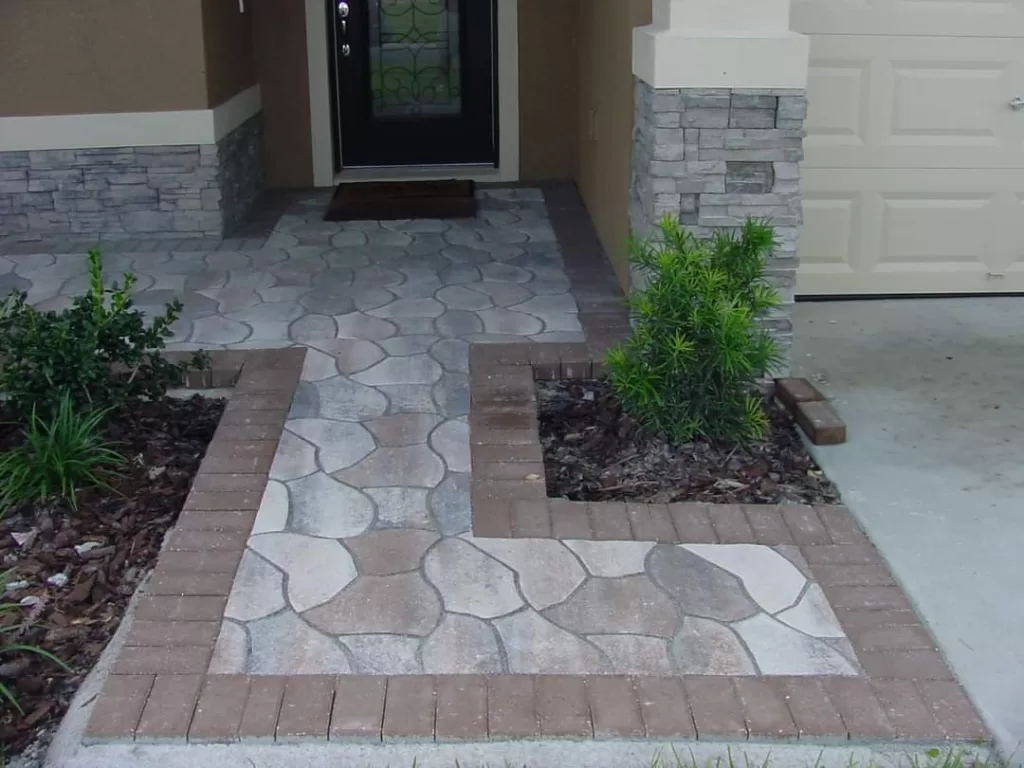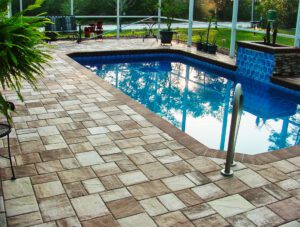Keeping Your Patio Pristine: A Guide to Maintaining Interlocking Pavers
Interlocking pavers offer a beautiful and versatile way to upgrade your outdoor space, creating patios, walkways, driveways, and more. But like any landscape feature, they require maintenance to retain their charm and functionality. This paver maintenance guide will equip you with the knowledge to keep your pavers looking and performing their best for years to come.

Daily Paver Maintenance
Maintaining a paver driveway, patio or pool deck doesn’t require truly daily maintenance but here are a few guidelines to keep your pavers looking sharp.
Sweeping: Your first line of defense is a simple broom. Regularly sweep away leaves, debris, and sand build-up to prevent stains and joint erosion.
Cleaning: For deeper cleaning, a garden hose and stiff-bristled brush can tackle dirt and grime. For tougher stains, use a paver cleaner designed for your material (concrete, clay, etc.). Avoid harsh chemicals or wire brushes, which can damage the pavers.
Joint Maintenance: Over time, joint sand can settle or wash away. Replenish with polymeric sand designed for pavers, following the manufacturer’s instructions. Always check your manufacturer’s guidelines before taking any action. The addition of fresh sand will ensure stability and prevent weed growth.
Seasonal Paver Maintenance Checkups
Just like most items around your home, pavers require a little love and attention to keep looking their best. Here is a basic seasonal paver maintenance schedule to keep your patio looking its best year-round:
Spring: After winter’s wrath, a thorough cleaning is essential. Inspect for damage caused by freezing or shifting, addressing any issues promptly. Consider resealing your pavers if necessary.
Summer: Keep an eye out for weeds sprouting in the joints. Apply a safe weed killer (we recommend a sprinkle of table salt or a squirt of white distilled vinegar) or manually pull them, being careful not to disturb the sand.
Fall: Remove fallen leaves promptly to prevent stains and decomposition. You can also apply a paver sealant before winter for added protection. Some paver installers and manufacturers require regular sealing to maintain the warranty.
Winter: If you live in a snowy region, use plastic or rubber snow removal tools to avoid scratching the pavers. Avoid using de-icing salts, which can damage the pavers and surrounding plants. Opt for sand or calcium chloride alternatives instead.
Pro Tips to Keep Your Pavers Looking New
Address spills promptly: Don’t let spills linger, as they can permanently stain or damage the pavers. Clean up spills immediately with appropriate cleaning solutions.
For extensive cleaning, repairs, or resealing, consider hiring a professional hardscape contractor. They have the expertise and equipment to ensure your pavers are restored to their former glory.
Seal it right: Pavers are porous and will absorb moisture. Moisture causes the product to prematurely deteriorate. Sealing your pavers every 3-5 years helps protect them from stains, weathering, and wear. Choose a high-quality, breathable sealant suitable for your specific paver material.

Do I need to seal the pavers in my paver patio, paver driveway or paver pool deck?
Yes, sealing pavers will extend their life and enhance their beauty.
Think of your interlocking pavers as tiny warriors braving the elements: sun, rain, snow, foot traffic, and more. While they’re tough, even warriors need armor! Sealing your pavers acts like a protective shield, significantly extending their lifespan and maintaining their beauty.
Eight Reasons to Seal your Pavers
- Sand stabilization: Sealing will lock in the sand. This prevent erosion of sand which allows pavers to loosen.
- UV Protection: Helps prevent fading of pavers under harsh Florida U.V. rays.
- Stain Prevention: Helps make pavers mildew and stain resistant.
- Weed & Insect Prevention: Helps prevent weed growth and insect infestation.
- Strengthen the Surface: Hardens the top surface of paver to help prevent wear and deterioration of pavers.
- Enhance Beauty: Highlights the natural colors of the pavers.
- Extend Life: Helps add years to the life span of your pavers keeping them beautiful for years to come.
- Lock in Pavers: Sealant helps keep pavers locked into place and will prevent pavers from becoming loose which may lead to cracked pavers.
Here’s a little more specifics about sealing pavers:
What happens to pavers if you don’t seal them?
Unsealed pavers are porous, absorbing water like a sponge. And if you don’t seal pavers then they will not perform at their intended levels.
Rainwater can lead to erosion and water-logged pavers can crack and chip in freezing temperatures.
Cracks and chips: As water freezes and expands, it puts immense pressure on the pavers, causing them to crack or chip.
Erosion: Water washing over unsealed pavers can erode the joints, loosening and displacing the pavers.
Stains: Oil, grease, food spills, and even plant debris can easily penetrate unsealed pavers, leaving unsightly stains that are difficult to remove.
Fading: Harsh UV rays can cause the natural color and vibrancy of unsealed pavers to fade over time.
Benefits of Sealing Pavers
So enough of the scare tactics, what are the benefits of sealing my pavers. They will last longer and perform better than unsealed.
Barrier against water: Sealant acts like an invisible raincoat, repelling water and preventing it from penetrating the pavers. This significantly reduces the risk of freeze-thaw damage and erosion.
Stain resistance: Think of sealant as a force field! It creates a barrier that makes it harder for liquids to stain the pavers, making cleanup easier and preventing permanent marks.
Sun protection: Some sealants contain UV protectants, shielding your pavers from the sun’s harsh rays and preserving their original color for longer.
Reduced maintenance: Sealed pavers require less frequent cleaning and maintenance, saving you time and effort.
Weed control: Some sealants have weed-inhibiting properties, reducing the need for frequent weeding in paver joints.
Enhanced appearance: Sealant can enhance the natural beauty of your pavers, making them look richer, brighter, and more vibrant.
Pro Tip: Sealing is not a one-time fix; resealing is typically needed every 2-5 years depending on the type of sealant and wear and tear.
What kind of sealant do you use on pavers?
Paver sealants are not all equal so do your homework. Professional-grade products tend to be a bit better quality. And choosing the right kind of sealant to use on your pavers is very important.
It is critical to choose the right sealant for your paver material and climate. Proper cleaning and preparation before sealing are also necessary for optimal results. If you want a professional touch, most paver installers also provide professional sealing and maintenance.
By following these simple steps, you can ensure your interlocking pavers remain a beautiful and functional part of your outdoor haven for years to come. Remember, a little preventive maintenance goes a long way in keeping your patio looking its best.
The Brickyard is a family-owned and operated paver business serving Central and West Central Florida. We are small enough to provide personal attention to details while also handling large complicated projects with lasting results.
Our expert paver and hardscaping designers will work with you to enhance and redesign your existing grounds, or collaborate with your new construction to create extraordinary living spaces for your family or business.
As our customer, you will experience the peace of mind that comes with knowing your project will be handled with professionalism by reliable craftsmen and creative designers using only quality products.
Our reputation is our most valuable asset and our team is dedicated to creating outdoor spaces that are both attractive and functional.
